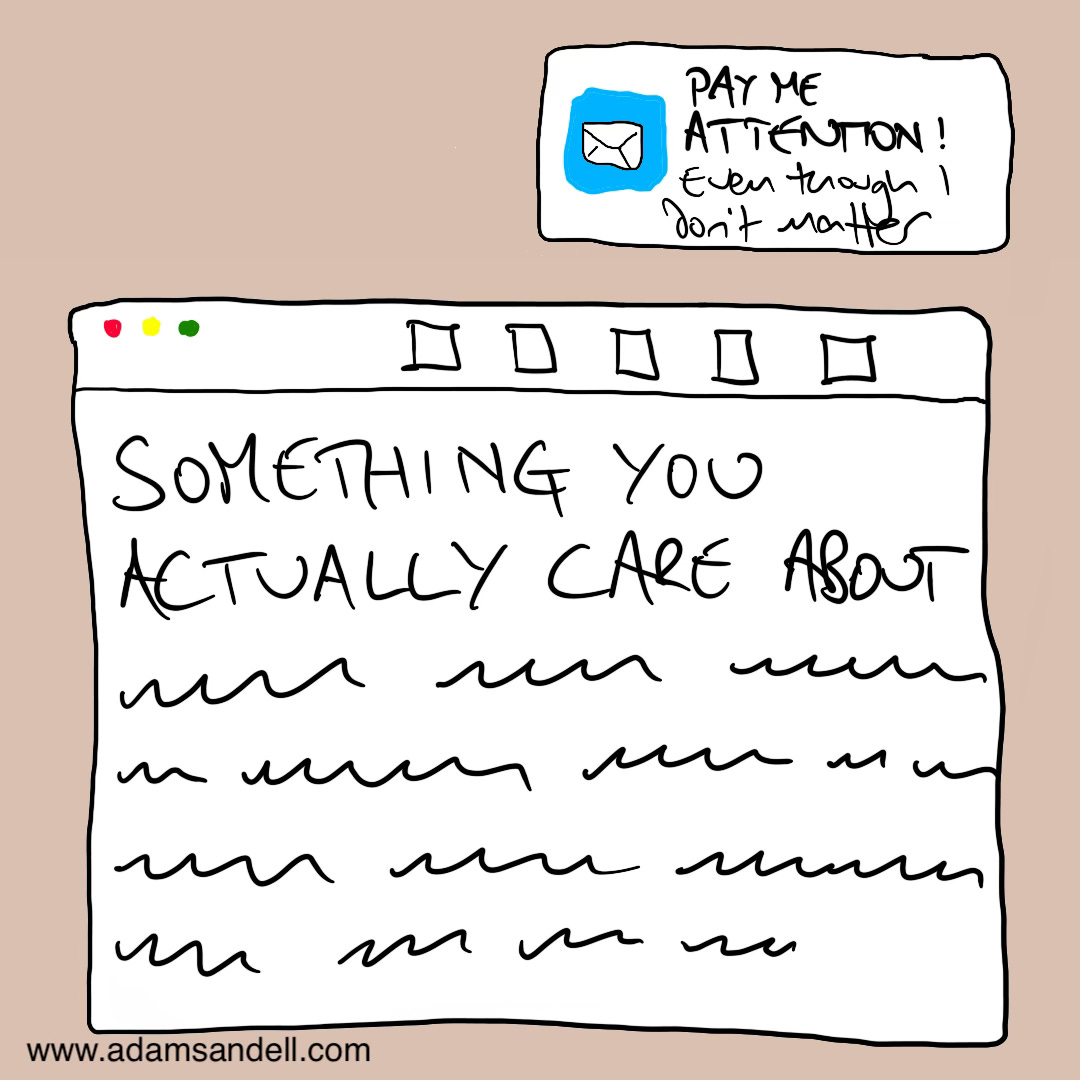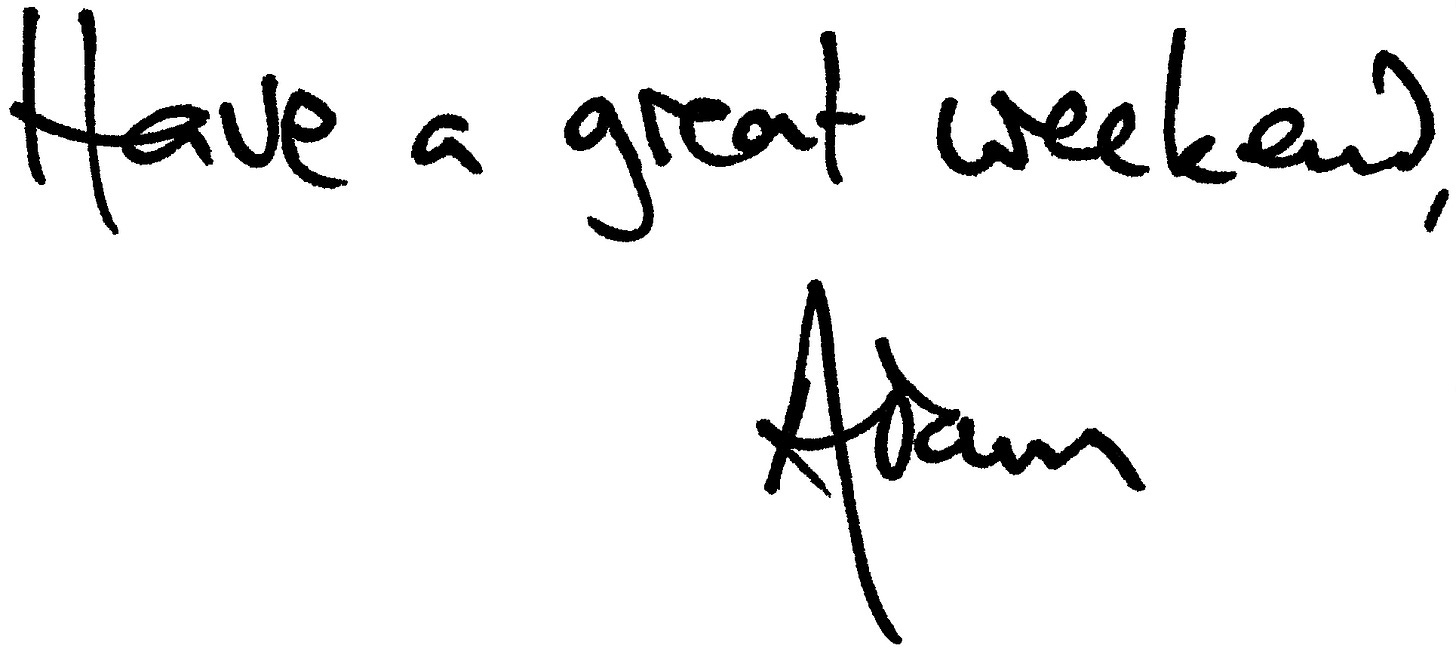Great Work / Introverts and Extroverts at Work
How does it affect you?
Introverts and Extroverts at Work
I’m looking for your help with this one—for a future article, and for the book I’m writing about all this. How does being an introvert or an extrovert affect your working life? For many people’s work wellbeing, this is big. I’d love to hear your own experience: what’s this been like for you, in your work?
Remember, the introvert/extrovert axis isn’t about whether you like people, have social skills, are shy, or are comfortable on a stage. There are plenty of introverted stand-up comedians and socially-awkward extroverts. It’s about whether you’re more at home in larger groups or in one-on-one conversations; whether you prefer noise or quiet; whether things going on around you stimulate you or distract you from your own thoughts. And, of course, it’s not binary: it’s a spectrum.
Paradoxically, a lot of work involving people seems to attract those toward the introvert end of the spectrum. As an introvert GP, I like the depth of connection I can make with one patient at a time—but a day of many of those leaves me exhausted. Introverted teachers have told me about counterbalancing the meaningfulness of relationships with individual students against the strain of performance in a crowd, and the need to retreat to somewhere quiet.
There are challenges for extroverts at work, too. You may feel lonely or under-stimulated in a team of more reserved colleagues; you may struggle with deep, solitary, reflective work; different approaches can create friction (one person’s confidence may be overbearing to another); and you may need more validation from others.
Lots has been said about the challenges of being an introvert when life often seems to value extraversion. “Many of the most important institutions of contemporary life are designed for those who enjoy group projects and high levels of stimulation,” wrote Susan Cain in her book Quiet: The Power of Introverts in a World That Can’t Stop Talking.1 But some things are harder for extroverts.
So: would you take a moment to help me develop something more useful about all of this? Would you let me know how your introversion or extroversion affects your working life? Just reply to this email (your reply goes straight to me) or comment on Substack:
Thank you!
Email Notifications
Having notifications switched on for emails, on your computer, phone, or any other device is (to use a lovely British word) daft. The mental costs of task-switching and distraction are huge (see here, here, here, and a wonderful, underappreciated little book called The Myth of Multitasking: How “Doing It All” Gets Nothing Done2). If you’re so important that you truly need real-time awareness of arriving emails, you probably already have a team of secretaries and support staff managing your inbox.
People worry that something awful will happen if they miss an urgent email. It almost certainly won’t—and you perpetuate the problem by training colleagues that you’re available by email within minutes (or seconds). Urgent ≠ important. And few things are truly urgent.
This is so easy. Just switch off email notifications and your life and your work will immediately improve.
For more on taming your screen and internet use, have a look at this previous article.
The Imposter Phenomenon
One of my earliest and most popular articles was on the imposter phenomenon ‘imposter syndrome’), and what to do about it. That was before I’d started recording audio versions. Because of its popularity, I’ve just done that—so, if you’d like me to talk to you about getting past the imposter phenomenon, there’s now a podcast version as well as the written article:
PS Should I do more of the terrible illustrations?
If you find anything helpful in these emails, it would be a huge help to me if you could recommend them to anyone—in any walk of life—who you think might like them. You can share this email …
… or encourage people to sign up …
… or you can send this link to people or post it on social media: www.adamsandell.com/newsletter. Thank you!
Cain, Susan. Quiet: The Power of Introverts in a World That Can’t Stop Talking. Crown Publishers, 2012.
Crenshaw, Dave. The Myth of Multitasking: How “Doing It All” Gets Nothing Done”. Coral Gables, Fl: Mango Publishing, 2021.









Adam,
Having known you for a few years, I knew you’d bring this up—and I’m so glad you did.
As an introvert, the biggest challenge I face in a work setting is making myself heard. There’s a bit of background to this, so bear with me.
I was a quiet child, quiet but content in my own head—a happy place. However, I grew up surrounded by chatty cousins. My well-meaning mother, worried about my silence, would urge me to speak up, not realising how difficult that was for me. I took it as a challenge. My first step? Study those talkative relatives and figure out what they talked about. After careful observation, I realized something: people talk about anything. Literally anything. That didn’t seem so hard.
Armed with this insight, I stepped into my group of cousins, ready to join in. But a new problem arose—when do you speak in a lively, fast-paced conversation? Everyone was talking and laughing, and I found myself waiting for a pause, a moment of silence, to jump in.
I soon realized that if I kept waiting for the perfect gap, I’d never get a chance to speak. So, I started interjecting. I carried this rude habit well into adulthood.
I also realised what happens when you’re always waiting for that perfect moment to speak:
1. The conversation moves on, and your bright idea—your valuable opinion—remains stuck in your head.
2. You’re too busy thinking about what you want to say instead of actively listening.
3. And the most frustrating one—an extrovert beats you to it. They voice that clever question or brilliant idea you were just about to share, and now it’s their idea.
Fast-forward to my professional life, and I still find myself searching for that elusive gap. Some considerate extroverted colleagues recognize this and invite me to share my thoughts with a simple, “What do you think?” But not everyone is that in tune with others, and those invitations don’t always come. Plus, the power dynamic now shifts to the person inviting you to speak.
I’ve found that I do much better when I’m chairing a meeting. The role gives me both the space and the authority to speak. I’ve also discovered that I am ok with public speaking. It’s your stage, you dictate the rules.
One would think that, at this stage in my career, I’d have mastered the art of making myself heard. Yet here I am, still grappling with the same challenge I faced as a child.
So, to my fellow introverts—have you cracked the code? How do you ensure your voice is heard in meetings? I’d love to hear your thoughts.
Kia ora Adam, I am definitely an introvert, and it can make my work life a bit draining at times. In academia, introversion makes networking difficult, especially because it doesn't feel like the "productive work" of sitting down and writing, or getting through the endless stack of papers to read. Networking and other meetings often lead to more opportunities and meetings, which can be daunting. My research is with Indigenous peoples (Māori), which I identify partly as, and Māori culture is very community-minded which I feel a bit hard sometimes, having grown up in an individualistic western household. By undertaking research with Māori, I have committed to becoming "a known face" in the community, learning the language, and building relationships with the community - these are positive things, but do lead to a lot more filling up of my calendar, which makes me feel a bit overwhelmed. In my clinical work, introversion isn't too bad. In fact like yourself, I've found it helps me connect more deeply with individual patients. But when it comes to CPD like peer review meetings, and staff socials (a hazard of any work place), it all gets a bit draining.
I've found that time autonomy is very important to me, and I quickly get unhappy and resentful if I'm out and about too much. So, if I start to feel that moodiness coming on, or I can see that I've got a busy few weeks ahead, I'll schedule a Selfish Day. The definition of Selfish Day is that it wouldn't matter if I stayed in my pjs all day - ie. no commitments or plans. I can leave the house if I want to, but essentially there is not reason why I should HAVE to get dressed for the day.